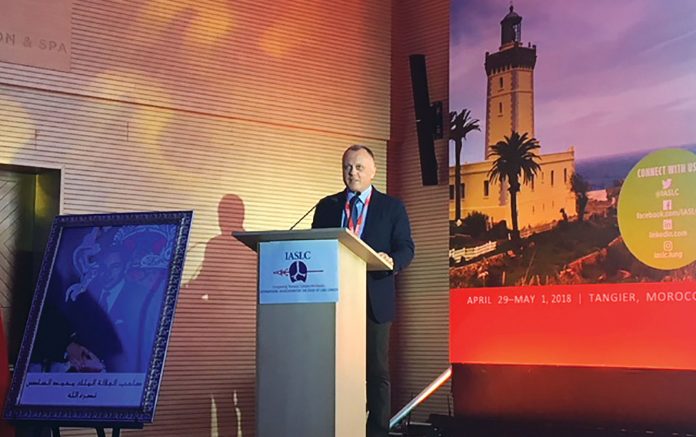
By Anna Wrona, MD, PhD
Posted: October 2018
The IASLC Africa Conference on Lung Cancer 2018 in Tangier, Morocco, held last spring, provided participants with unique expert perspectives in lung cancer epidemiology, diagnostics, and treatment. This meeting created a collegial environment for open discussion among its international participants. The program offered a number of substantive and directly applicable discussions beginning with the first day’s roundtable discussion on opportunities and challenges associated with clinical trials in Africa and on treatment-related best practices regarding the surgical management of early lung cancer, optimal combination of chemoradiotherapy in locally-advanced lung cancer, immunotherapy application, and lung cancer screening. The plenary session focused on practical approaches to improve networking and cooperation among Middle East and North Africa Countries.
The second day’s program featured for discussion of clinically relevant topics such as the epidemiologic landscape of lung cancer in Africa, tobacco control issues, practice implications regarding the 8th edition of TNM classification, molecular targeted therapies, immunotherapies, the intricacies of lung cancer staging procedures with PET/CT and mediastinal lymph nodes evaluation with endobronchial ultrasound, and oligometastatic lung cancer in the context of optimal local ablative therapies (surgery, stereotactic radiotherapy) exploitation. (For more on oligometastatic lung cancer, read the editorial by Drs. Dingemans and Hendriks.) Multidisciplinary case-based discussions about precise indications for surgical treatment of early lung cancer compared with the benefits of sterotactic radiotherapy provided holistic approaches to real-life questions.
The conference also allowed for discussion of more sensitive topics such as pharmacoeconomic limitations and limited drug access, with potential solutions suggested by and provided to members of the pharmaceutical industry, advocacy groups, the medical and academic community, and even the African governments. Bridges were also built between Moroccan Foundation Lalla Salma for Cancer Prevention and Treatment and the IASLC Foundation.
As a conference attendee, it is apparent that the knowledge and expertise that the IASLC brings to such an event is important; the creation of a forum to exchange experiences, concerns, and ideas is invaluable. Friendships have been made, collaborations developed, and steps for diagnostic and therapeutic improvement solidified; however, there is more work to be done. ✦
About the Author: Dr. Wrona works as a consulting radiation oncologist and academic in the Department of Oncology and Radiotherapy at the Medical University of Gdansk, Poland.










